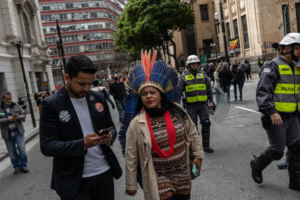Besieged and ignored, Brazil’s Indigenous women are running for office
For more than two years, Vanda Ortega Witoto watched from her village in the Amazon as Brazil’s chaotic response to the coronavirus brought catastrophe to her people.
“I saw my leader die without oxygen,” said the 35-year-old nursing technician, a member of the Witoto people. “I saw my relatives being buried after no ambulance took them to the hospital.”
Now Witoto, who lives in the remote Aldeia Colônia in Amazonas state, is running for Brazil’s congress.
“We can’t ask for help from the state when we don’t have our representatives, because those who are there are not sensitive to our cause,” she said. “They don’t even know about our existence and have no reason to defend it.”
They sat on the sidelines and watched others — mostly non-Indigenous men — make the decisions and pass laws that have threatened their land and impacted their lives. Now Indigenous women are fighting back.
A record number of Indigenous women are running for office in Sunday’s election — for state legislatures, for congress, for the vice presidency — as part of a concerted effort to increase Indigenous representation in government.
They come from different states, speak different languages and are running with different parties. But many share a common goal: to undo policies of President Jair Bolsonaro that they say have removed protections, undermined their rights and encouraged record deforestation in the Amazon.
The costs of campaigning, a lack of access to information about the electoral process — sometimes even the absence of ballot boxes in their remote villages across the vast Amazon — can make political participation for these communities particularly challenging.Many of the candidacies this year are long shots. But the effort is seen as a necessary step toward eventual representation.
“Under Bolsonaro, Indigenous rights have been totally dismantled,” said Sônia Guajajara, from the Guajajara people of the Arariboia Indigenous lands in Maranhão state.
Bolsonaro, a right-wing populist, is running Sunday for a second term as president. Guajajara, 48, who made Time’s list of the 100 Most Influential People of 2022 for her Indigenous rights activism, is running for a seat in congress with the Socialism and Liberty Party.
